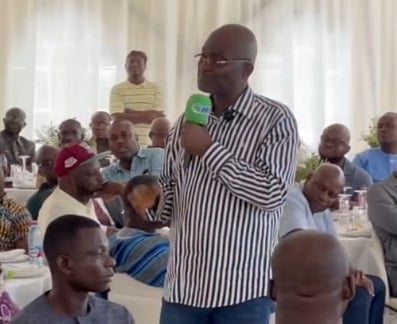Kennedy Agyapong, a prominent figure in the New Patriotic Party (NPP) and a contender for its presidential candidacy, recently hosted a private luncheon with 268 former Metropolitan, Municipal, and District Chief Executives (MMDCEs) who served during the previous Akufo-Addo administration. This strategic meeting, held at Agyapong’s private office in Accra, served as a platform for him to connect with grassroots leaders and present his vision for the party’s future, particularly in the context of the upcoming NPP flagbearer election scheduled for January 31, 2026. Agyapong’s outreach emphasizes his focus on rebuilding party unity and addressing concerns of neglected local leadership.
The luncheon provided Agyapong with an opportunity to engage directly with former MMDCEs, many of whom expressed frustration with their treatment during the previous administration. Central to their discontent was the perceived centralization of power in Accra, which they felt hampered their ability to effectively govern and implement development initiatives at the local level. Agyapong acknowledged these concerns, emphasizing his commitment to restoring authority to local officials and reinvigorating grassroots governance if elected as the party’s flagbearer. He positioned himself as a champion for decentralized leadership, promising to empower local officials and give them the tools necessary to drive development in their respective communities.
Agyapong’s engagement with the former MMDCEs highlights his strategic focus on garnering support from the grassroots level of the NPP. He framed the prevailing centralization of power as a detriment to effective governance and development, arguing that it disempowers local leaders and hinders progress. By promising to reverse this trend, Agyapong aimed to resonate with those who felt marginalized and overlooked during the previous administration. His message resonated with the attendees, reflecting a broader sentiment within the party for greater inclusivity and recognition of the vital role played by local leaders.
This outreach initiative by Agyapong mirrors a similar effort by another presidential hopeful, former Vice President Dr. Mahamudu Bawumia, who recently hosted over 60 NPP MPs who declared their support for his presidential bid. This illustrates the intensifying competition within the NPP as various contenders seek to consolidate support among different segments of the party. While Bawumia has garnered significant support from within the parliamentary ranks, Agyapong’s focus on grassroots leaders demonstrates a different approach to building a strong base of support.
Agyapong’s platform emphasizes internal party reform and decentralization, contrasting with other candidates who may focus on different aspects of party policy or strategy. He presented his vision for a more inclusive and participatory governance model, arguing that empowering local leaders is crucial for effective development and for strengthening the party’s connection with its constituents. This message of reform and decentralization is designed to appeal to those who feel the party has become overly centralized and disconnected from its grassroots base.
In conclusion, Agyapong’s luncheon with former MMDCEs represents a calculated move to mobilize grassroots support within the NPP ahead of the crucial flagbearer election. By addressing the concerns of local leaders and promising to restore their authority, Agyapong seeks to position himself as a champion for change within the party. His emphasis on decentralization and grassroots empowerment contrasts with the more centralized approach perceived during the previous administration, offering a potentially compelling alternative for party members seeking a different direction. As the NPP navigates this critical juncture, Agyapong’s focus on grassroots engagement will likely play a significant role in shaping the party’s future and its trajectory towards the 2028 general elections.














